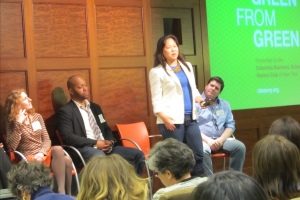Jacquie Ottman's
Green Marketing Blog
Can Product-Sharing Sustain the Earth AND the Economy?
May 22, 2012 by Michelle Hardy, Guest Blogger

Good green marketers push the innovation of different products. Better products. But can we profit from making fewer products in the first place? “Swap Don’t Shop,” the most recent of the Columbia Business School Alumni Club’s Making Green from Green events, explored this very dilemma.
The panel began with a sobering point; Moderator Cameron Tonkinwise of the Parsons School of Design Strategies reminded his audience of green business advocates that for all the sustainable sourcing, the holistic manufacturing, the reusable materials, and whatever else constitutes our so-called green products, efficiencies are cancelled out the moment we manage to sell a greater quantity of those products.
If, however, we use our efficient products within business models that require fewer of them to be in circulation, we’ll most certainly reduce waste. The real question, then, is whether there’s money to be made in doing so.
The “Swap Don’t Shop” panelists — all entrepreneurs within the “sharing economy” predicted to reach $110 billion in value — answered this question with a resounding yes.
Take Carpooling.com, for instance.
The company’s International Senior Product Manager Odile Beniflah explained how the tremendous demand for this car-sharing service has grown to two million users a month across 45 countries. She’s now preparing for their launch in the U.S., where the average car is used merely one hour per day while having 3-5 empty seats.
“The greatest public transportation infrastructure we have is the empty seats on the road,” Beniflah explained.
This correlation between wasted materials and wasted money was a common theme throughout the panel discussion. When products aren’t being used to their fullest capacity, or when they could be resold on a secondary market, why not take advantage of these unrealized opportunities for profit?
This is the goal of “mesh” companies, or those companies that use websites and social media to convert a product need into a service offering, therefore extending the life and use of each product while removing the need for consumer ownership.
A mesh company can even avoid holding inventory altogether by facilitating peer-to-peer product trading, as demonstrated by the “Swap Don’t Shop” panelists. Carpooling.com enables people to advertise empty seats in their personal vehicles. Snap Goods uses an innovative tool to help people find the members of their own social networks most likely to trade certain goods with them. Similarly, Closet Raid helps people sell, swap, or give away products to their own social media contacts. Key WiFi helps people rent their Internet connection to those who can’t afford to be connected in hopes of fostering a more efficiently connected society.
But while the supply of “sharing economy” services often thrives on ecologically minded entrepreneurs, it seems the demand for those shared goods is usually motivated by a different sort of green. According to the panelists, their services are marketed first and foremost as ways of saving money — not ways of avoiding excess waste.
Such indirect messaging isn’t a new idea.
Green marketing expert and CBSAC committee member Jacquelyn Ottman cleverly brought the industry’s attention to this fundamental principle in her latest book, The New Rules of Green Marketing. When branding sustainable products or services, core messaging must appeal to consumers’ self-interests. By underscoring the primary benefits most relevant to that item’s function (such as how car sharing saves you money or how responsibly manufactured clothing makes you look good), you establish your brand as more of a need than an idealistic want.
Most importantly, this subtle approach broadens your target market. It was this latter rationale panelists emphasized the most. For a sharing economy to expand and prevail, after all, the philosophy must pervade mainstream consumer groups. In the same respect, it must pervade mainstream companies. Try telling brands that incorporating sharing services into their business model could lower costs, broaden their target markets, and extend the profit-making capacity of every product involved, and you might drive greater change than you would with environmental guilt appeals.
But in the end, it won’t matter if companies actually like product sharing; they’ll have to live with it. That’s why General Motors and Ford invested in peer-to-peer car sharing companies this year, and it’s why major auto manufacturers in Germany, such as Volkswagen, recently launched car-sharing programs. Ironically, it’s possible that companies investing wisely in sharing could face more opportunity than risk. Car-sharing revenues in North America, for example, will hit $3.3 billion by 2016 according to Gartner Group researchers.
Sharing Economy to Yield Macoeconomic Benefits
Overall, it seems possible for a healthy national sharing economy to yield many macroeconomic benefits. Sharing services could create countless jobs for entrepreneurs. Sharing options could open up niche or expensive products to much wider consumer markets. Sharing frameworks adopted by manufacturers could extend the money-making capacity of their products without requiring additional production costs. Just imagine a major manufacturer or retailer that is the producer or designer of products - and the facilitator of sharing services for those products.
While ownership and one-time-use will never become obsolete, scarce resources will dictate that they become less frequent in most product categories. For this reason, sharing may very well be the 21st century’s miracle fuel in that it is nearly immune to ecological constraints. After all the efficiencies gained from the Industrial Age and the Information Age, the greatest efficiencies of all may be yet to come in the Sharing Age.
All of this brings to mind the saying so cleverly recalled by Key WiFi founder and CEO Adam Black. “Cavemen didn’t stop building with stone because they ran out. They stopped because they found better materials.”
We have plenty of materials… for now. Only thinking about now, though, has never made anyone rich or famous. Will cooperative networks power our future?
Michelle Hardy is a communications professional and an experienced promoter of green business and social entrepreneurship. Follow her on Twitter to stay in touch with the New York green scene: @greenerbigapple
This was originally published in A Greener Big Apple on May 8, 2012
Recent Blog Posts:
- What Green Consumer Polls Should Really Be Asking
- Shop ‘Til You Drop—but on Earth Day?
- Swap, Don’t Shop: Making Green in the Sharing Economy
Subscribe to Jacquie Ottman’s Green Marketing Blog. Link Here



 ShareThis
ShareThis

